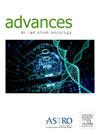美国国立卫生研究院资助放射肿瘤学研究:十年比较趋势分析,2011-2021
IF 2.7
Q3 ONCOLOGY
引用次数: 0
摘要
目的:资助放射肿瘤学的发现和研究对于提高治疗策略以改善癌症患者的预后至关重要。我们的目的是全面描述美国国立卫生研究院(NIH)资助放射肿瘤学研究的趋势,以确定趋势、成功和需要改进的领域。方法和材料我们查询了NIH研究组合在线报告工具支出和结果数据库,以确定由学术中心的主要研究人员进行的所有获得资助的放射肿瘤学研究,使用3年作为代表性样本(2011年、2016年和2021年)。人工检索获得资助的摘要和关键词,以确定与放射肿瘤学领域相关的最终资助;主要研究人员的部门关系也被用作补充方法,作为敏感性分析来定义放射肿瘤学相关研究。描述性统计用于描述筹资模式。采用χ2检验评价分类变量的比例差异。结果:不到NIH总预算的0.5%;在代表性研究年份,国家癌症研究所总预算的2%用于支持放射肿瘤学研究。随着时间的推移,这种分配模式没有显著变化。一小部分机构持有美国国立卫生研究院支持的放射肿瘤学拨款中相对较大的比例。仅拥有博士学位的人获得了大部分资金(62%),而拥有双学位(医学博士/博士)的人获得了21%的资金,而仅拥有医学博士的人获得了17%的资金。随着时间的推移,授予医学博士/博士学位的比例呈上升趋势(分别为24%和15%,分别为2021年和2011年,P = 0.075)。尽管放射治疗在多学科癌症治疗中发挥了重要作用,但在过去十年中,美国国立卫生研究院和美国国家癌症研究所对放射肿瘤学研究的资助仍然低得不成比例。这些数据可能有助于为未来的政策提供信息,这些政策旨在促进放射肿瘤学在微观(个人)和宏观(机构和国家)层面的研究进展。本文章由计算机程序翻译,如有差异,请以英文原文为准。
National Institutes of Health Funding to Support Radiation Oncology Research: A Comparative Trend Analysis Over a Decade, 2011-2021
Purpose
Funding to support radiation oncology discovery and research is essential for advancement in therapeutic strategies to improve outcomes for patients with cancer. We aimed to comprehensively characterize trends in National Institutes of Health (NIH) funding that supports radiation oncology research over time to identify trends, successes, and areas for improvement.
Methods and Materials
We queried the NIH Research Portfolio Online Reporting Tools Expenditures and Results database to identify all awarded grants to support radiation oncology research conducted by principal investigators at academic centers, using 3 individual years as representative samples (2011, 2016, and 2021). Abstracts and keywords for resulting grants were manually searched to identify resulting awards topically related to the field of radiation oncology; principal investigators departmental affiliation was also used as a supplemental method serving as a sensitivity analysis to define radiation oncology-related research. Descriptive statistics were used to describe patterns in funding. χ2 testing was used to assess differences in proportions of categorical variables.
Results
Less than 0.5% of the total NIH budget and < 2% of the total National Cancer Institute budget supported radiation oncology research during the representative study years. There were no significant changes in this allocation pattern over time. A small cohort of institutions held a relatively large proportion of NIH-supported radiation oncology grant funding. Individuals holding PhDs alone received the majority of funding (62%), whereas those with dual-degrees (MD/PhD) held 21% of funding, and those with MD alone were awarded 17% of funding. There was a trend toward an increased proportion of grants awarded to MD/PhDs over time (24% vs 15% in 2021 and 2011, respectively, P = .075).
Conclusions
Despite radiation therapy's essential role in multidisciplinary cancer care, NIH, and National Cancer Institute funding to support radiation oncology research has remained disproportionally low over the last decade. These data may be useful to inform future policy aimed at promoting research advancement in radiation oncology both at the micro (individual) as well as macro (institutional and national) level.
求助全文
通过发布文献求助,成功后即可免费获取论文全文。
去求助
来源期刊

Advances in Radiation Oncology
Medicine-Radiology, Nuclear Medicine and Imaging
CiteScore
4.60
自引率
4.30%
发文量
208
审稿时长
98 days
期刊介绍:
The purpose of Advances is to provide information for clinicians who use radiation therapy by publishing: Clinical trial reports and reanalyses. Basic science original reports. Manuscripts examining health services research, comparative and cost effectiveness research, and systematic reviews. Case reports documenting unusual problems and solutions. High quality multi and single institutional series, as well as other novel retrospective hypothesis generating series. Timely critical reviews on important topics in radiation oncology, such as side effects. Articles reporting the natural history of disease and patterns of failure, particularly as they relate to treatment volume delineation. Articles on safety and quality in radiation therapy. Essays on clinical experience. Articles on practice transformation in radiation oncology, in particular: Aspects of health policy that may impact the future practice of radiation oncology. How information technology, such as data analytics and systems innovations, will change radiation oncology practice. Articles on imaging as they relate to radiation therapy treatment.
 求助内容:
求助内容: 应助结果提醒方式:
应助结果提醒方式:


